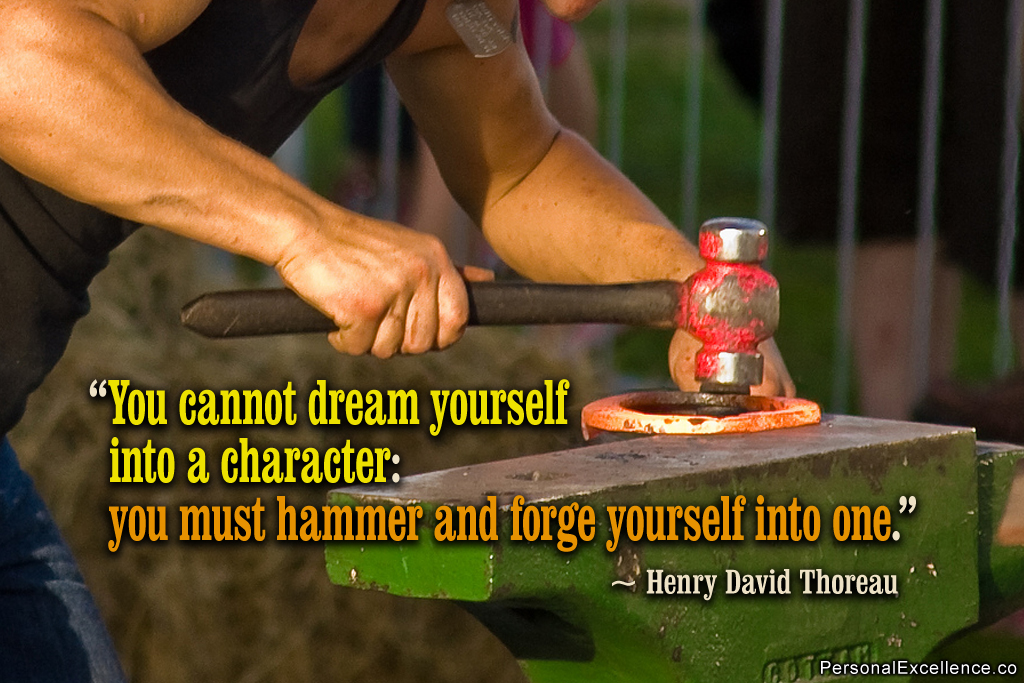Do you sometimes use words like “I won’t,” “I can’t,” “I don’t know how,” and “I wish I could” in your self-talk or when conversing with others?
While it’s okay to use such words when the situation calls for it, someone who uses self-limiting lingo like these on a regular basis subconsciously tunnels him/herself into a life of limitations, powerlessness, and self-doubt. On the other hand, someone who uses empowering language like “I can”, “I am”, and “This will be mine” attracts abundance, achievement, and success, simply because such language sets him/her in the right mindset to succeed.
Today’s infographic shares the relationship between your language and success:
![How Your Language Relates with Success [Infographic]](https://personalexcellence.co/files/infographic-self-talk-success.jpg)
(Click image for larger version (Infographic by Ninja Infographic))
While not scientific, this graphic does help us see the impact that positive and negative our language has on our life.
I can definitely recognize past situations when I used “I can’t,” “I don’t know how,” and “I wish I could,” and ended up feeling anguish, victimized, and miserable even though I had put my best foot forward in those situations.
On the other hand, I’ve worked through problems with the mindset of “I can,” “I am,” and “I will” (not inside the infographic) and achieved great results, even though I didn’t have the solutions at the start. Because I believed that I could, I found a way to work through the problems by hook or by crook.
Which category do you belong to? Do you use negative or self-doubting lingo in your daily language? How can you start using empowering language like “I can,” “I am,” “I will,” “This will be mine,” and “I will get it done?” Replace your negative lingo with empowering lingo from now on.
As you work on your language, remember that language can be an effect of one’s self-confidence, rather than a cause. Build your self-belief and self-confidence from within at the same time. Read:
- How to Create Real Change In Life: Address Root Cause vs. Effects
- How To Be The Most Confident Person In The World
- Are You Self-Sabotaging? (Understanding Self-Sabotaging Behavior and Breaking It)
- 7 Limiting Beliefs Keeping You from Living Your Best Life
- How Your Language Affects Your Success (My BFM 89.9 Interview)





![5 Tips to Deal with Negative Criticism [Video]](https://personalexcellence.co/files/video-negative-criticism-400x267.jpg)

 If you like my articles, join my community of 65,000 readers and get my latest articles delivered to your inbox. Your email is safe. 100% no spam.
If you like my articles, join my community of 65,000 readers and get my latest articles delivered to your inbox. Your email is safe. 100% no spam.
I love this article. I’ve been struggling with my self-confidence for some time now and positive thinking is a good place to start. The info graphic really helps. :)
Best wishes on your wedding day. Many years of love and happiness to you!
I just wanted to say that I love you so much Cel. Your site has truly changed my life, and I´m defenatly going to recommend you to other people ^^
You. Are. Awsome <3
Change your words, change your life – absolutely.
Most dramatic, maybe, when you change “I can’t” for “I won’t.”
The challenge with language is that we create it detached from reality. You show a child a picture of a cow and the child says “Cow” – it doesn’t say “Picture of cow.”
Nothing wrong with pictures per se, and it’s certainly okay with cows, but when the only experience we have of, say, war, is that from war pictures – the implications can be serious.
PS. Cute infographic.
Great InfoGraphic Celestine. The irony of the situation is that most of us know this stuff because we have heard them from others. However despite this we still use them. Another one I think should on on there is “I Will”. Its an interesting one for me as a lot of people suffer from this. Its the habit of procrastinating. I will… but we never get around to doing it.
When we use empowering language like “I can,” “I am,” “I will,” etc it’s like giving our mind the green signal to ‘go for it and do it’.
This does require a high degree of openness to our approach to life and we must train our minds to ignore/not fear the limiting chatter within.
You put it perfectly : “Someone who uses self-limiting lingo like these on a regular basis subconsciously tunnels him/herself into a life of limitations, powerlessness, and self-doubt.”
Even obvious nonsense can feed doubt and discouragement, if you only hear it often enough.
Terrific Post and thank you for the pointers.
Best wishes for your wedding Celestine. Have an ‘Awesome Life’
Interesting. For me, when I say (out loud) “I can’t” what I usually mean is “I’m still thinking about it and processing this possibility.” I guess this can be used as an important checkpoint for certain personality types (mine!) that if the idea is stuck in the lower, left-hand side of the diagram it may mean the idea is not right for you or not right at the present time. For intuitive types it’s important to examine if the hesitancy is caused be complacency or real concerns. “I can’t” often means “I don’t want to!”
P.S. Congratulations and Good Luck for your wedding ceremony!
enjoy your holiday and best wish for your wedding!! Celes :D
There are areas in my life in which “I can’t” and “It’s impossible” are rule, while in other areas I feel strong and in charge (“I can,” “I am,” “I did”). It all depends on how comfortable I am with a situation or with certain circumstances (obviously). What I’ve noticed is that my family and my closest friends have the biggest power to influence me and my beliefs. For example, a friend told me that she had tried really hard to get an apartment of her own and that it was impossible, so this kind of made me less sure about my dream to have my own place, because I know it’s difficult, although I don’t necessarily believe it’s impossible.
Hi Lina! I agree that there are areas where “I can’t” (including “I won’t”) is the rule, say for things that you don’t agree with and refuse to do. For example, if someone wants me to promote a service I don’t agree with on PE, I’ll simply reply in that manner.
I see the infographic as pertaining to our language towards our goals, dreams, and situations in our life. I remember before/when I started PE, everyone kept telling me it’d be tough if not impossible, along with other fear-based reactions. My self-talk then was simply, “I can” and “I am going to do this,” and ultimately looking back, this was exactly what helped me to make everything work out in the end.
Good thing to keep your integrity. In my comment I didn’t refer to his particular kind of situation, but it’s a great point to make nevertheless. When I said that “I can’t” is a rule I meant that my self-negative talk is stronger when it comes to certain life areas as opposed to others.
Being your own supporter is always a good idea: there will always be someone to try to bring you down, so you might as well be the one cheering for yourself.
On a different note, I wish you best of luck with the remaining preparations for your wedding and looking forward to see a picture of you and Ken at your wedding. All the best to both of you! :)
Great infographic. I hate to admit it, but I sometimes say “I’m planning on” or “I’m planning to”. I’m not sure where these would fit on the chart? But I say this, because they usually are things that require planning, or are things that will take a while to get done.
By the way Celes, what do you think of the “Fake it until you make it” advice? Like if someone wants to be a chef, but they have no experience in cooking, they will tell people they’re a chef anyway, and as a result will eventually become successful at it from telling people it’s what they do, and in that time actually doing whatever they can as a part of that fake persona.
I hear you Glenn! I think “I’m planning to” has a risk of giving us a “feel good” feeling without us having the urgency to complete something (though exceptions apply). I have noticed that whenever I say “I’m planning to” for something, it never happens for the next three months. I feel what will help is a date or timeline is assigned to it, say “I’m going to do this by X.”
That’s an interesting question on the “Fake it until you make it.” I do think it has its value — while most people see goal achievement as “taking the action, then declaring you have realized the goal when you achieve the results,” fake it until you make it is about assuming you are at the end point, then finding all resources and ways to make that happen. There have been times when I have done that before and subsequently realized the goal too! The great part about it is that by thinking that you’re at the end goal, you start assuming the consciousness of a person who has realized that goal, and hence take the right actions / act in the right way to make it happen. It depends on what you are most comfortable with really — I see both ways as possible paths to realize the end dream!
Commenting for this post is closed.